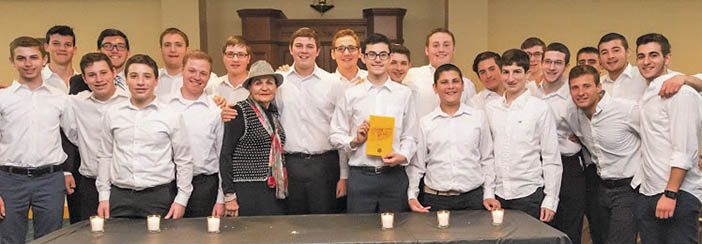
On Thursday, May 5, the seniors at Torah Academy of Bergen County conducted their annual multi-media Yom HaShoah (Holocaust Remembrance Day) program. After opening remarks from Rosh HaYeshiva Rabbi Yosef Adler, the program began with a candle-lighting ceremony. Eight students presented emotional accounts of their respective relatives, some still alive, who suffered at the hands of the Nazis. Moshe Papier spoke of his great-uncle Israel who was deported to Auschwitz and later to Melk. He survived the concentration camps and was liberated in 1945. He immigrated to America and became involved in the diamond industry, where he created what is known today as the radiant cut diamond. Jacob explained that it was his great-uncle’s “steadfast faith and unwavering will” that kept him alive and helped him achieve success.
“This program is so meaningful in that it enables us to connect to our ancestors and continue their legacy today and for future generations,” commented Nafi Lieber, who designed the program leaflet, and, together with his brother Azi, lit a candle in memory of their great-grandparents.
The Holocaust curriculum, taught by Mrs. Cary Reichardt, sensitized the TABC students to what the Shoah meant. “This class introduced a different perspective on the Holocaust and made me want to bond with my ancestors. It provided me a greater understanding of who we are and where we came from,” Yoseph Mirwis told the Jewish Link. As part of the curriculum, students were asked to compose a poem connected to the Holocaust. “The Search for Reason and Explanation,” a poem written and recited by Yehoshua Segal, was both meaningful and thought-provoking, providing imagery relatable to the Holocaust as well as introspection for today’s thinker. It enabled listeners to feel like they were actually enduring the atrocities of the Holocaust, and addressed the question of why such a thing would occur.
Drew Stromer presented the Class of 2016 student perspective on the Holocaust. His family was directly impacted by the Holocaust through his paternal grandmother, Gusta Stromer, who jumped from a cattle car window heading to Auschwitz and returned to her hometown, where she was sheltered by a Polish priest. Unfortunately, her two sisters did not escape and were eventually killed. Stromer emphasized the importance of this generation and future generations remembering those who have been lost. Not only did millions of Jews perish in the Holocaust, we lost generations who would have descended from those martyrs. Therefore, it is the responsibility of Jews today to perpetuate the memory of those killed. He added that a new Hitler arises in every generation, and throughout America we are bearing witness to anti-Zionism on college campuses through campaigns such as BDS. These groups who despise the Jews mask their objectives as anti-Zionist. However, in essence, “anti-Zionism is anti-Semitism.” Stromer emphasized that defending Israel is the way to defend Jews and to never allow another Holocaust.
The choir performed two songs, “Habet,” led by Mr. Sammy Schaechter, and “Song of the Partisans,” led by Mrs. Reichardt. During the performance, a PowerPoint presentation created by Moshe Stuart of photographs taken on his recent trip to Poland appeared in the background. When asked how the experience affected him, he said, “I have a greater appreciation for people, Judaism and my family—immense appreciation!”
This year’s guest speaker was Mrs. Frima Laub, the grandmother of TABC student Yoni Laub. Upon introducing his grandmother, Yoni noted that she always maintains a positive attitude and is an inspiration to his family. A child survivor, Mrs. Laub was a mere five years old when the war broke out. She recalled living a normal life and attending kindergarten when she heard the first bomb drop nearby. She attributes her existence throughout the Holocaust to her fundamental belief in prayer. “Hashem listened to my prayers and that is why I am here today,” she told the audience. During the Holocaust, she was separated from her parents and was forced to survive on her own. Just a small child, she was scared and often helpless. She relied on many non-Jews to help her along the way, occasionally changing her own identity on the outside in order to survive. She lived two lives, one she displayed to the public which included wearing a cross she purchased with the rubles her mother left her, and the other, her true identity, which she revealed every night as she recited Shema Yisrael. “I had righteous gentiles helping me. They were my angels on Earth, many of whom were treated with respect and kindness by my family during the pre-war years.” Mrs. Laub highlighted the significance of always treating others with respect and kindness. She believes the Jewish people are special and will remain so if we act as such.
Often, when discussing the Holocaust, people are inclined to ask why such a thing happened. Mrs. Laub said she felt one should never question why. She believes in prayer and the unrelenting belief in Hashem as a savior. As heard from many survivor testimonies, it seems inherent in the struggle for survival was their unwavering faith in Hashem. Mrs. Laub concluded with one final message, “Stand up against our oppressors. The survivors and those who are no longer here depend on the young generation to remind the world of what Hitler did to us. The young people of today are the voices of tomorrow.”
The atmosphere exuded a feeling of sadness but also one of pride. The audience felt pride in hearing how Frima Laub conquered the enemy by preserving her belief in Hashem, surviving the Holocaust and creating a family and a legacy. There was pride felt in knowing that these boys, the future of our people, understand the significance in commemorating the Holocaust and vowing to never allow it to recur. The program culminated with a powerful rendition of the Kel Malei recited by Rabbi Adler.
By Andrea Nissel









